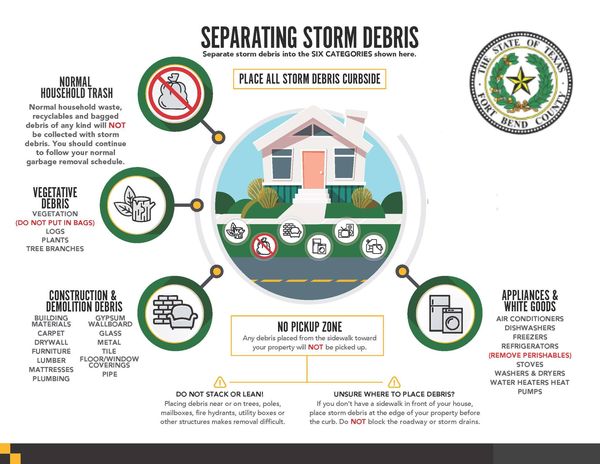Hurricanes are dangerous and can cause major damage because of storm surge, wind damage, and flooding. The associated debris and cleanup efforts can be more efficient with proper preparation and planning. The following will help you get ready for hurricane season.
Through storm surge, wind damage, and flooding. Proper preparation and planning can make the associated debris and cleanup efforts more efficient. The following will help you prepare:
After the STORM:

Debris Information
After the Storm has Passed
We suggest you follow these simple guidelines for optimal efficiency, safety, and timely debris collection.
- Please be patient. Following a storm, the top priority is the health and safety of our community and the restoration of the county
- Debris collection guidance and recovery process updates will be available through local media, the Fort Bend County government website, and social media
- Keep debris area clear of vehicles and trailers to avoid delays in pick-up. Contractors cannot pick-up with piles are blocked
- Keep household garbage, recycling, and vegetative and/or construction storm debris in separate piles. Debris must be neatly stacked or piled curbside by debris type
- Securely containerize all household garbage in plastic bags or carts to be placed curbside on your scheduled day away from storm-related debris
- Storm debris should be sorted into separate piles by disaster-related vegetative debris, construction and demolition, electronics, appliances, and white goods.
- Don't place any debris near or on a fence, mailbox, power line equipment, poles, transformers, downed electrical wiring, water meters, fire hydrants or storm drains
- Don't block roadways, traffic signs, drains, or storm water structures
- Avoid placing debris on paver driveways or other areas that might be susceptible to inadvertent damage
- Small quantities of yard waste can be prepared like your weekly collection guidelines. View guidelines at your servicing disposal agent portal.
- Pick-up will generally be done with a mechanized claw truck, so it’s important that you not set debris over buried electric/phone lines, water meters, hydrants, or mailboxes. Inspectors will tour each part of the county to determine where collection needs are greatest
- Debris will be collected from the curb on multiple passes by a mechanical claw
- After a major storm event, yard waste associated with land clearing and landscape improvement activities is not eligible for collection; disposal of this type of debris is the responsibility of the property owner at the property owner’s expense
COMMERCIAL PROPERTY
Debris generated from commercial properties, such as industrial parks, golf courses, cemeteries, apartments, condominiums, and trailer parks are the responsibility of the owner, and are expected to retain insurance that covers debris removal.
